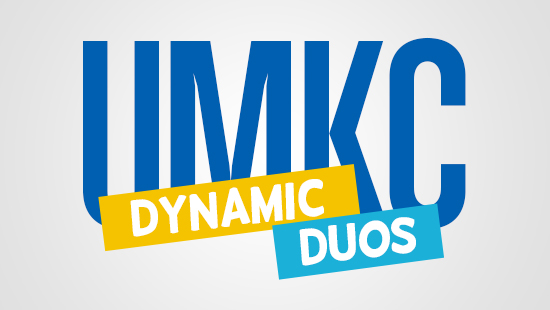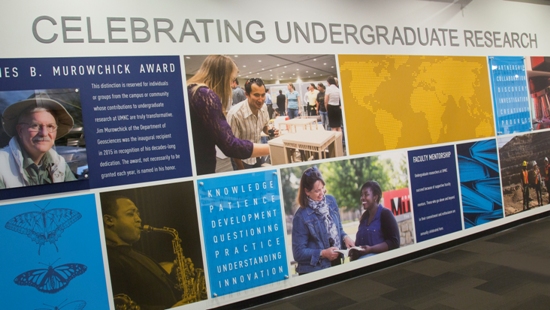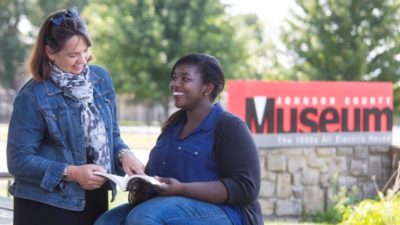The next chapter of UMKC’s student storytelling series is all about mentorship

Many successful people give generous credit for their achievements to the guidance of mentors who counseled them as young adults. At the University of Missouri–Kansas City, mentorship is a vital part of the educational experience. One of the common threads in the ongoing “Our Students. Our Story. #UMKCGoingPlaces” series on the UMKC site and tumblr is how students appreciate the work of their mentors.
To focus even more on those crucial mentorship relationships, we’re introducing another regular feature: Dynamic Duos. In interviews and images, we’ll give you an intimate look at faculty/staff-and-student mentorship pairs at UMKC.
Read the other Dynamic Duos articles.
MEET LERIE GABRIEL and JANE GREER
Lerie Gabriel graduated in December 2015 with a bachelor’s degree in English and Literature, and this fall she plans to start pursuing her master’s degree, also at UMKC. She credits Jane Greer, her English professor and UMKC’s program director of undergraduate research, for igniting her passion in research and leading her to become a scholar — not just a student.
On the main level at Miller Nichols Library, there’s a large photo of Gabriel and Greer in a new Celebrating Undergraduate Research mural. The main goal of the mural, organized by Greer, is to annually recognize effective mentors. An awards ceremony for UMKC mentors took place in April.
Lerie, why did you choose the research you’ve been pursuing?
LG: I am doing my research on Corinthian Nutter, an African American woman in Merriam during the 1940s who used her position as a humble teacher to help desegregate Johnson County schools.
When I first heard the story of Corinthian Nutter, I was immediately interested. As close as Johnson County is, it is unfortunate that not many are familiar with Nutter or the Johnson County court case that provided precedence for Brown v. Board of Education. Though I began my research for a class paper, I knew that I needed to know more about this woman who risked her career so that African American children could receive justice. The SUROP (Summer Undergraduate Research Opportunity Program) grant made it possible for me to develop my research.
How did you choose a mentor?
LG: I had a class with Dr. Greer. When she first mentioned the SUROP grant to the class, I had already made up my mind that my writing skills were not good enough. But the more she talked about SUROP, the more interested I became. When I finally went to talk to her about applying, she encouraged me to go for it. She has been there, assisting and encouraging me, since then.
Dr. Greer, one of the things you’re encouraging Lerie to do is to pursue her interest in obtaining her master’s degree. How long have you been mentoring students?
JG: I’ve been trying to be a good mentor for my entire career, but I think that once I took students — both graduate and undergrad — into the archives with me, starting around 2001, I started to realize how powerful it could be for my students and I when we worked together to recover the rhetorical practices of women and girls. The dynamic of the student/teacher relationship shifted, and I was able to focus more on modeling how to be a scholar, rather than just transmitting knowledge or research skills.
What advice do you give students looking for a mentor?
LG: If there is a teacher who you see is genuinely passionate about their work, start there. They have resources and know people — if they can’t do it themselves — who can assist you in getting where you want to go.
JG: Think about whether you seem to click with that faculty member in terms of work ethic, tolerance for ambiguity, preferences in terms of hierarchy and authority, sense of humor. Research suggests that matching with a mentor in those kinds of areas are what really makes for a successful mentoring relationship.
Lerie, what are the benefits of having a mentor?
LG: There are so many. Whenever I feel stuck or unsure of my research, Dr. Greer gives me the guidance and support I need. The passion she has for her research and teaching rubs off on me and every time I leave her office, I feel so much more confident in my work. She has helped me build up my repertoire of scholars. She has shown me new resources and introduced me to people who I would otherwise not have known. I would not be able to do this without Dr. Greer.
Dr. Greer, what’s your favorite part of being a mentor?
JG: Seeing students like Lerie succeed and watching them accomplish things they didn’t think they could do. Some of the undergraduates take their experiences into the community and pursue all kinds of fascinating and important careers. I love keeping track of all of their varied successes.
I have to confess that I actually think I get the most out of mentoring relationships. Students have taught me so much — about particular primary sources they’ve found in the archives, about strategies for research, about ways to frame questions, about approaches to writing. But even more importantly, they’ve taught me about the world and about how to muddle along with grace and generosity. So many UMKC students juggle all kinds of challenges — family, health, finances — and they remain committed to getting the most out of their time at UMKC and to achieving their goals. Getting to share in their journeys has, I think, made me a better person.


